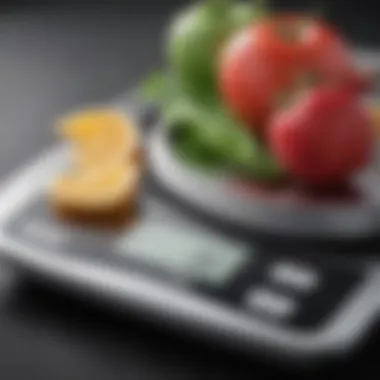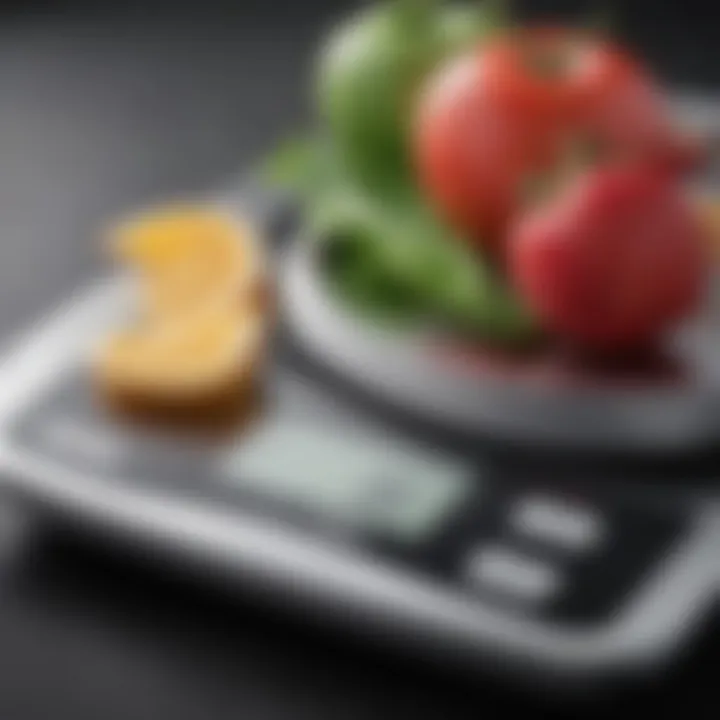Comprehensive Reviews of Smart Diet Scales


Intro
As we navigate through the complexities of diet management, it's easy to feel overwhelmed. Luckily, technology has come to our rescue, introducing tools that promise precision and ease. Enter smart diet scales—devices that not only weigh food but also connect to mobile applications to help manage dietary goals and track nutritional intake. This article embarks on a journey to explore these innovative scales in depth, offering insights and evaluations from various perspectives. Whether you're a seasoned dieter or someone just stepping onto the health-conscious path, understanding these tools is crucial.
The relevance of smart diet scales extends beyond weight measurement. These scales present a seamless interface between technology and nutrition, perfect for anyone looking to take charge of their eating habits. In the following sections, we’ll discuss key features, potential benefits, and the pitfalls users may encounter. By doing so, we aim to equip you with the knowledge needed to make informed choices in this ever-expanding market.
Intro to Smart Diet Scales
In today’s fast-paced world, keeping a close eye on our dietary habits has become more crucial than ever. As awareness about nutrition continues to grow among consumers, smart diet scales emerge as the innovative solution to simplify this task. These devices are not just your ordinary weighing tools; they encompass cutting-edge technology designed to aid users in achieving their dietary goals efficiently.
Understanding smart diet scales is vital, as they represent a significant leap from traditional methods of food measurement. Mainstream interest stems from their ability to integrate seamlessly with smartphones and various apps, thus offering users a streamlined experience in tracking their food intake and overall nutritional profile. This evolution of diet scales moves us from a simple numeric value to a comprehensive view of eating habits.
The Evolution of Diet Scales
Looking back, diet scales were primarily mechanical. You had a dial that turned with the weight of your food. It was simple, but it lacked nuance. Advancements in technology have transformed this rudimentary tool into an intelligent device that not only weighs but also analyzes and provides insights. It is fascinating to see how these scales evolved from clunky, metal structures to sleek, digital gadgets that fit effortlessly into our modern lives.
The introduction of features like Bluetooth connectivity, food databases, and nutritional tracking has shifted their utility completely. Imagine knowing not just how much you're eating, but what you're eating in terms of calorie count, nutrient content, and even suggested healthier alternatives. It’s as if the old-fashioned scale has been given a major upgrade, tailored to the sophisticated needs of today.
Purpose and Functionality
At their core, smart diet scales serve a simple yet profound purpose: to enhance the user’s awareness of their eating habits. They bring functionality that resonates well with diverse dietary needs—whether someone is managing weight, adhering to a specific diet, or simply looking to eat healthier.
- Precision Measurement: These scales provide precise weight measurements, important for portion control. A user can easily measure out ingredients for a recipe without the guesswork.
- Nutritional Information: Most smart scales come equipped with databases that list the nutritional values of various foods. This allows users to see the bigger picture, not just weight. With a few taps on their phones, individuals can track calories, carbs, fats, and protein intake.
- User-Friendly Interfaces: The digital displays and mobile app integrations offer an intuitive experience. Users can manage their progress over time with easy-to-read graphs and tracking features.
"Smart diet scales have revolutionized how we think about food intake. They go beyond simple weighing to provide a full nutritional profile, offering endless possibilities for healthier living."
In essence, these scales aren’t just tools—they are partners in the journey toward better health. With their ability to adapt to individual dietary goals, they help instill a sense of accountability. As we engage with technology more, the role of smart diet scales in our lives becomes ever more significant.
Key Features of Smart Diet Scales
Understanding the key features of smart diet scales is paramount as it lays the groundwork for making educated decisions regarding dietary changes. These devices do more than just weigh; their integration into daily life can enhance nutritional awareness and meal preparation. Let’s take a closer look at what sets them apart from traditional scales and how they can provide better insights into our diets.
Digital Measurement Techniques
One of the cornerstones of smart diet scales is their digital measurement techniques. Unlike their older counterparts, these scales offer precision and immediacy. Digital screens provide not just a static weight reading but often show measurements in real-time. Many models possess advanced sensors that adjust for minor discrepancies, ensuring the results are consistent and reliable.
Additionally, scales like the Etekcity Kitchen Scale utilize load-cell technology, which calculates weight with accuracy to the gram. This precision can be crucial for those tracking macros or trying to stick to a specific diet, as the difference between a few grams can sometimes be the difference between meeting goals or not.
Integration with Mobile Applications
Equally important is how these scales integrate with mobile applications. A large number of smart diet scales, such as the Withings Body+, connect seamlessly to dedicated smartphone apps via Bluetooth or Wi-Fi. This compatibility allows for the easy transfer of data, letting users track their progress over time.
The apps often feature user-friendly interfaces that accompany graphs and charts, helping users visualize their dietary progress. Furthermore, many of these applications can sync with broader health tools or fitness devices, creating a comprehensive wellness ecosystem. This interconnectedness makes it easier for users to juggle diet amidst busy schedules, ensuring that good habits are maintained effortlessly.
Nutritional Information Tracking
Another revolutionary aspect to consider is the nutritional information tracking. Some smart scales come equipped with the ability to identify food items and calculate their nutritional values. For example, scales like the Greater Goods Bluetooth Kitchen Scale have a built-in nutritional database. Once you input the food item or its barcode, the device displays grams of fat, carbohydrates, sugars, and more. It’s a huge leap toward a more informed diet.
This feature allows users to gain insights into their daily intake without manually logging each meal. It makes it simpler to stay within dietary limits and understand the impact of food choices on overall health. However, users should remember that the accuracy of these databases can vary, and occasionally cross-referencing with reliable nutritional sources may be wise.
"In the age where technology often drives our daily routines, integrating smart diet scales into our lives could potentially redefine how we view our nutrition."
In summary, the key features of smart diet scales—from their precision measuring techniques to their data integration capabilities—present a powerful tool for anyone serious about their diet. As consumers increasingly seek ways to streamline their dietary management, understanding these aspects offers substantial benefits in ensuring one’s choices align with their health goals.
Analyzing Popular Smart Diet Scales
In the realm of dietary management, understanding popular smart diet scales serves a crucial purpose. These scales provide a blend of technology and nutrition science, offering insights that can help users not just track their food intake, but also make educated decisions about what they eat. The importance of analyzing popular smart diet scales lies in their ability to cater to varied dietary needs, offering functionalities that traditional scales lack.
Leading Brands Overview
When it comes to leading brands in the market of smart diet scales, a few names stand out. It’s not just about the device; it’s about the reputation behind it. Here are some of the most reputable brands:
- Etekcity: Known for their reliable performance and user-friendly design, Etekcity has garnered a positive reputation among consumers.
- Withings: This brand has made waves for integrating health tracking with smart devices, standing out in terms of aesthetics and functionality.
- Fitbit: While primarily known for their fitness trackers, Fitbit’s expansion into diet scales complements their range of health-related products.
- Smart Weigh: Focused on accuracy and robust design, this brand appeals to those seeking precision in their dietary measurements.
Each of these brands offers unique features that address varied consumer needs, whether it’s mobile integration, body composition analysis, or ease of use.
Comparison of Key Models
Comparing key models of smart diet scales can aid consumers in making informed decisions based on specific needs. Here’s a detailed look at some popular options, highlighting their features:
- Etekcity Smart Nutrition Scale:
This scale is not only capable of weighing food but also provides comprehensive nutritional information. With a large display and an intuitive app, it’s suited for anyone wanting to keep track of their dietary intake effortlessly. - Withings Body+:
Featuring not just weight measurement but also body fat percentage and water percentage, it syncs with the Health Mate app, allowing users to set goals and track progress seamlessly. - Fitbit Aria 2:
Known for its sleek design, this smart scale integrates well with Fitbit devices. It offers a user-friendly interface and accounts for multiple user profiles, making it ideal for families. - Smart Weigh Kitchen Scale:
Offering precision up to 1 gram, this model is perfect for those serious about cooking and portion control. Its affordable price point makes it accessible without skimping on essential features.
By examining these models closely, consumers can weigh the pros and cons relevant to their lifestyles. Each scale has been designed keeping in mind specific preferences, making them suitable for a broad audience, from casual dieters to meticulous cooks.
"Understanding the specifics of popular smart diet scales unlocks the potential for improved dietary habits, considering both accuracy and functionality."
In summary, analyzing popular smart diet scales reveals much about their role in today’s health-conscious world. Consumers benefit greatly from the information provided through these devices, and knowing the leading brands and models adds a layer of confidence in choosing the right product.
Consumer Reviews and Testimonials
In the world of smart diet scales, consumer reviews and testimonials serve as a vital touchstone for understanding how a product truly performs in everyday settings. They provide insights from real users, offering a glimpse into the advantages and disadvantages of various models. This feedback is not only crucial for potential buyers but also for manufacturers keen on improving their products.
The significance of these reviews extends beyond mere opinion. They offer concrete examples of how these scales function within the hustle and bustle of daily life. For instance, someone might share how their smart dietary scale helped them lose weight by keeping track of portion sizes and nutritional content. Positive testimonials can be like gold dust, highlighting particular features that shine in practical use, while negative experiences can serve as cautionary tales.
Here are some reasons why consumer reviews are so important:
- Real-world application: Feedback reflects real-life usage, unlike promotional descriptions that might be overly optimistic.
- Diverse perspectives: Users come from different backgrounds, with varying dietary habits, so their insights can cover a wide spectrum of experiences.
- Beta testing: Many users inherently beta-test products, revealing flaws or benefits that the manufacturers might have overlooked.
With the rise of the internet, platforms such as reddit.com and facebook.com have further amplified the voice of the consumer, enabling more extensive discussions about various smart diet scales.
"Hearing from fellow users was the game-changer for me. I was able to dodge pitfalls and find models that genuinely worked for my lifestyle."
This exploration of consumer reviews and testimonials enriches our understanding of the smart diet scale landscape.
Positive Experiences
When users share their positive experiences with smart diet scales, it’s not just about praise for a product; it’s narrative of transformation. Many find that these scales have significantly altered their approach to eating. For instance, a dieter might describe their joy at discovering how easily they could track their macros with just a few taps on their app. They might mention that they felt empowered, using the scale not just as a tool for measurement but as a companion on their weight management journey.
Some common themes in positive feedback include:
- Ease of Use: Many report that the scale’s user-friendly interface made it significantly easier to log food and track caloric intake.
- Accurate Readings: Several testimonials highlight high accuracy compared to traditional methods of measuring ingredients.
- Community Support: Users often appreciate the online forums and app communities associated with their scales, where they share tips and recipes, making the whole experience more rewarding.
Common Complaints
On the flip side, it’s essential to acknowledge the common complaints that arise from user feedback. While smart diet scales boast numerous advantages, they aren’t every user's cup of tea. Some users report frustration with app integration; say, a malfunctioning Bluetooth connection can really sour the experience. Others express concerns over battery life, with some scales finding themselves running out of juice at the most inconvenient times.
Noteworthy complaints include:
- Inconsistencies in Measurement: Users sometimes find discrepancies between the readings from their scale and other measuring devices.
- Price Concerns: While many weight management tools can be found at various price points, some users deem smart scales too pricey for the value they offer.
- Technical Difficulties: Issues like complicated setup processes or unclear manuals can lead to irritation.
These insights from consumer reviews and testimonials create a rounded picture for anyone interested in smart diet scales, showcasing the highs and lows of user experiences.


Benefits of Using Smart Diet Scales
Smart diet scales are gaining traction among food enthusiasts, dieters, and health-conscious individuals. These gadgets are more than just high-tech weighing machines; they offer a variety of features to simplify the process of dietary management. Understanding the benefits of using smart diet scales is fundamental for anyone aiming to maintain, lose, or gain weight.
Enhancing Dietary Awareness
One of the prime benefits of using smart diet scales is their role in promoting dietary awareness. It’s easy to lose track of nutritional goals without proper guidance. Smart scales take the guesswork out of equation by providing an accurate read of the food’s nutritional content. For instance, when weighing a serving of quinoa, it not only tells you the weight but also offers the breakdown of calories, carbs, proteins, and fats.
- Smart scales often come equipped with apps that sync data allowing users to keep an eye on intake over time.
- By using these features, individuals can spot dietary deficiencies or excesses, paving the way for meaningful dietary adjustments. It’s a wake-up call when you realize that a handful of nuts has far more calories than what one might presume.
"Knowledge is power; in nutrition, it’s your superpower."
Facilitating Meal Prep and Portion Control
Meal preparation can be a daunting task. However, smart diet scales make this process smoother and more efficient. By weighing portions accurately, users are better equipped to control their serving sizes, which is a critical element in achieving dietary goals.
Let’s say one wants to make a vegetable stir-fry; the scale can help to determine how much rice or vegetables are appropriate for one serving. This not only avoids overindulgence but ensures that the meal is balanced in terms of macronutrients.
- With classic scales, underestimating or overestimating portions is all too common.
- Smart scales eliminate this error by providing precise measurements, helping dieters resist the temptation to go back for seconds. The instant feedback these devices give can be quite encouraging.
Supporting Weight Management Goals
Weight management is a journey, not a destination. Smart diet scales lend a helping hand through this journey in multiple ways. They can track progress by connecting with apps that record weight loss or gain, providing feedback that is critical. This is especially important for someone who is trying to stay accountable to their own goals.
- Regular weighing on smart diet scales helps in observing trends rather than focusing solely on daily fluctuations.
- Their integration with your smartphone or tablet allows for a holistic overview of weight management and makes it easier to stick to a regimented plan.
In essence, using smart diet scales can be the key to gaining clarity in one’s dietary habits. They foster a more mindful approach to eating, which may otherwise go overlooked.
Potential Drawbacks
When discussing smart diet scales, it is crucial to recognize that, while they boast numerous benefits, there are some notable drawbacks. Understanding these limitations ensures that consumers make well-rounded decisions. Potential drawbacks can influence the overall effectiveness of these devices and the user's experience. In the quest for dietary precision, it's wise to keep one’s eyes peeled for these issues that could trip up even the most dedicated health enthusiasts.
Accuracy Concerns
While smart diet scales often come equipped with advanced technology, accuracy can still be a vexing issue. Some users claim their readings fluctuate wildly—one second it shows 200 grams, and the next moment it’s dancing around like a bohemian on a Friday night. This inconsistency can deter even the most patient of dieters, rendering the scale less reliable for achieving volume-based dietary goals.
Moreover, it’s common to find that these devices may not account for variations in food density or moisture content, which could lead to miscalculations in nutritional values. Take, for instance, weighing a fluffy pastry versus a compact piece of chocolate—both will yield different readings despite the apparent size. Hence, while users invest in technology, one must question if the scale truly meets their needs without creating more headache.
Price Variability
When it comes to smart diet scales, preparing to dish out a fair chunk of change isn’t unusual. The price spectrum can be as wide as the Grand Canyon, running anywhere from modestly priced to pretty darn expensive. Higher-end models often flaunt exclusive features such as connectivity to apps, enhanced accuracy, and sleek designs—yet even mid-tier choices can provide many of these qualities without breaking the bank.
The key here is to weigh cost against functionality. If you’re a casual user, maybe a basic model suffices. For serious health aficionados, investing in a high-end scale that promises precise tracking may seem rational. However, that also begs the question: are all those extra dollars really worth it? One's budget plays an essential role in deciding whether to fork out cash for a gadget, particularly when the market is peppered with options that often overlap in functions.
Technical Issues
Every tech item, no matter how shiny it appears, may run into hiccups, and smart diet scales are no exception. Users sometimes report frustrations stemming from connectivity issues—when trying to link their scales to their mobile apps, they may find themselves in a bind, scratching their heads as devices refuse to cooperate. Complicated interfaces can also turn a simple task of measuring food into a labyrinthine challenge, leaving users wondering why they even bothered trying to go digital.
Additionally, software bugs aren’t unheard of, leading to errant entries in nutritional databases or, worse, malfunctioning scales. This can lead even the most determined health warrior to throw in the towel, questioning the reliability of their digital companions. Furthermore, as technology moves forward at a wicked pace, older models may not support the latest applications, leaving those invested in them feeling rather left in the lurch.
Understanding these potential drawbacks can empower users and allow them to make informed choices that align closely with their health objectives, rather than getting swept up in the allure of tech without comprehending the implications.
In summary, while smart diet scales provide innovative solutions for tracking nutrition, users need to remain vigilant regarding accuracy, price, and potential technical setbacks. Ignoring these factors could lead to frustration rather than the fulfillment of dietary goals.
Comparative Analysis with Traditional Scales


In the realm of dietary management, weighing food has often been overlooked, yet fundamentally impactful on our nutritional choices. Smart diet scales offer a fresh take on this essential practice, blending technology and simplicity. As modern consumers become more health-conscious, understanding how smart scales stack up against their traditional predecessors is crucial.
Functionality Review
At the heart of any comparison are the features that make one option preferable over the other. Traditional scales primarily provide weight measurements. They do this well, but that’s where their capabilities end. In contrast, smart diet scales deliver a buffet of advanced functionalities:
- Nutritional Information: Beyond just a number, these scales connect to apps that allow users to log caloric intake, nutrient breakdowns, and even help track dietary restrictions.
- Portion Control: Some smart models come with built-in guides that suggest ideal portion sizes for various food items based on individual dietary needs.
- Interconnectivity: Many smart scales can sync with fitness trackers and wellness applications, creating a seamless experience in managing overall health.
This leap in functionality means that people can gain insight into their eating habits that traditional scales simply do not provide. However, this advanced functionality might come with a steeper learning curve, as some users may feel overwhelmed by the tech side of things.
User Experience Insights
The user experience can fluctuate significantly between the two types of scales. For traditional scales, the experience is straightforward—place the item on the platform and note the weight. But for smart diet scales, users may face a range of experiences based on several factors:
- User Interface: Brands differ widely in how intuitive their apps are. Some users have voiced frustrations about navigating unfamiliar tech, while others rave about interfaces that feel like a walk in the park.
- Calibration and Accuracy: Some smart scales may offer calibration options that improve precision over standard models, but this also introduces a margin for error if not calibrated correctly. Users might find themselves in a pickle trying to ensure readings are spot-on.
- Ease of Use: Generally, smart diet scales strive for convenience, often enabling connections with voice-activated devices or automatic food categorization. While this can be incredibly beneficial, it also risks overcomplicating a process that should be quite simple.
"The pull towards tech in everyday items is strong, but convenience should never outweigh accuracy—especially in health management."
Overall, the choice between a smart diet scale and a traditional model largely hinges on personal priorities. For someone who enjoys diving deeper into nutrition tracking and has the patience for a little tech savvy, a smart scale might be just the ticket. On the other hand, for the no-nonsense user who appreciates straightforwardness in health management, a traditional scale might fit the bill better.
Future Trends in Diet Scales
The future of diet scales presents a fascinating outlook that is crucial for readers who want to stay ahead in managing their health. As technology accelerates, the way we think about food and diet is constantly evolving. Smart diet scales aren't just about weight; they're becoming integral tools for overall dietary awareness and management. Nowadays, as we embrace technology, it's essential to recognize advancements that stand to redefine our eating habits, making tracking and accountability easier than ever.
Technological Innovations
Expect to see some jaw-dropping innovations in smart diet scales in the near future. IoT (Internet of Things) is paving the way for kitchen devices to be more connected, allowing smart scales to sync with various kitchen appliances and nutrition apps seamlessly. Imagine a scale that not only weighs your food but also calculates the nutritional content in real-time while suggesting recipes based on what you have on hand. This type of functionality could potentially reshape meal prep, making it more intuitive for users.
Sensors are getting more accurate, too. Advanced scales might utilize AI to learn from your previous entries and offer tailored suggestions. For instance, if you often prepare grilled chicken for dinner, the scale could remind you of your preferred portions or alert you when you're exceeding recommended amounts.
Some companies are even exploring wearables that can pair with diet scales to holistically track health metrics like body fat percentage, hydration levels, and metabolism. The integration of these technologies ensures that diet scales evolve from simple weigh-in tools to comprehensive dietary assistants, providing a clearer picture of overall wellness.
Evolving Consumer Demands
As consumers become more health-conscious, their demands from diet scales are shifting as well. It's not just about weighing food; people want products that help them make informed choices. This drive for knowledge has led to the need for more transparency about nutritional data, including default serving sizes and potential allergens.
Customization is also a big ask. A one-size-fits-all approach doesn't cut it anymore.Consumers appreciate scales that can align with specific dietary goals, whether it's keto, vegan, or gluten-free. The market is responding by offering scales that allow users to input personalized dietary preferences, creating custom profiles that enhance the user experience.
Furthermore, with the rise of sustainability in food production, individuals are looking for smart scales to help them reduce waste. Future models may incorporate features that track expiry dates or suggest using ingredients before they spoil.
This evolution in consumer behavior is changing how manufacturers design and market smart diet scales, ultimately aiming for more interactive, user-friendly, and resourceful tools that resonate with the modern eater.
"As the landscape of consumer health continues to change, the hunger for smarter, personalized dietary solutions is just beginning to reshape smart diet scale technology."
In summary, the future trends in diet scales emphasize technological advancements and a corresponding shift in consumer expectations. Each innovation aims to foster a more connected, informed, and personalized approach to nutrition, ensuring that as consumers evolve, so too do the products they depend on.
End
The exploration of smart diet scales concludes with a clearer understanding of how these devices interlace technology and nutrition management. It's not merely about tracking what's on your plate but embracing a holistic approach to health. Smart diet scales present numerous benefits alongside a few considerations that every user must weigh.
Final Thoughts on Smart Diet Scales
As we step back to reflect on smart diet scales, it's evident that they offer an innovative solution to modern dietary needs. The integration of digital technology allows individuals to monitor their intake with precision that old-fashioned scales simply can't achieve.
The scales not only measure weight but also provide insights into nutritional value and portion sizes. This could radically alter someone’s eating habits over time, shifting from just consumption to mindful eating. The capability to sync with mobile applications amplifies this effect, making tracking food intake as easy as pie, pun intended. However, while the bells and whistles of these gadgets are impressive, it's crucial to remember that they are just tools. The real work of maintaining a balanced diet lies in other choices made each day.
Making an Informed Choice
When choosing a smart diet scale, some factors should be front and center. Here are a few elements to consider:
- Feature Set: Look for scales that track not just weight but also nutritional information.
- User Reviews: Read up on consumer feedback to gauge personal experiences.
- Price Point: Weigh the cost against the benefits it provides. Not every high-priced item warrants a purchase.
- Ease of Use: Ensure the device is user-friendly and aligns with your tech comfort level.
- Brand Trustworthiness: Go for brands with a good reputation and customer service.
Making informed choices is about doing homework. The best tool can only support your health goals; it can't make the choices for you. In the end, marrying technology with personal discipline often reaps the best rewards. As you consider a shift towards healthier eating habits, remember the smart diet scale is merely a stepping stone on the path towards better nutrition and overall wellness.







